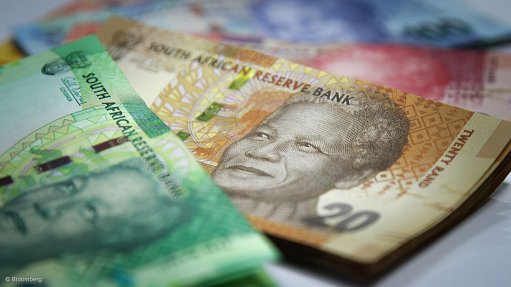
Photo by: BLOOMBERG
In light of the shock 1.3% contraction in the second quarter of last year, and the low 0.7% growth in the following three months, the South African economy is unlikely to have expanded beyond 1.5% in 2015, cautioned banking group Nedbank in its Macroeconomic Outlook and Event Risk report, released on Wednesday.
Nedbank noted that, despite a modest recovery in the final quarter of the year, the country experienced political uncertainty, social tension, tighter monetary policy responses, a slump in gross domestic product growth, severe drought, and the foreign sale of bonds and equities.
The blowout in the rand/dollar exchange rate and government bond yields towards the end of the year further hampered growth, the report asserted, adding that the outlook for 2016 remained poor amid a “discouraging” policy backdrop that was unlikely to improve in the short term.
“Interest rates are trending higher, infrastructure constraints remain and the global economic climate will still be difficult,” read the report. Nedbank also predicted that a slowing in China’s economy and the US’s gradual tightening of its monetary policy would continue to act as global headwinds.
“We see domestic growth of around 1.3% for 2015 and 0.2% in 2016, with the economy forecast to enter a technical recession by the third quarter of 2016. The South African Reserve Bank is expected to hike policy rates by a cumulative 75 basis points in the first half of the year, after which we expect rates to remain on hold until 2017.”
The report added that there was a “high likelihood” of further ratings downgrades in 2016, given the extent of instability in the near term, as well as the continued deterioration in macroeconomic conditions.
A downgrade by Standard & Poor’s from ‘stable’ to ‘negative’ in 2015 further predisposed the country to a high risk of a downgrade to subinvestment grade at the 2016/17 review.
“Eyes will remain on policy shifts as well as the National Budget, to be presented in February,” said the bank.
Further, the report held that fiscal consolidation had not been aggressive enough to warrant any improvement in the ratings outlook, while expected “revenue-raising” in the 2016 National Budget would likely erode the growth outlook further, despite shoring up the country’s ability to service debt.
“The current account deficit appears slightly more promising, given the recent and expected consolidation, but this is not likely sustainable, given South Africa’s position as a structural importer.
“The deficit is likely to narrow in 2016, as rand weakness dampens import demand, particularly for consumer goods, but the extent of its fall will be limited by sluggish export growth,” noted the report.
Meanwhile, upside risks to inflation emanated from a possible drought-induced spike in food prices and sharp electricity tariff hikes, with the Monetary Policy Committee expecting the rand to remain under pressure as the US normalised interest rates further in 2016.
“We therefore anticipate more tightening in 2016, with prime forecast to peak at 10.75% in 2016,” Nedbank noted.